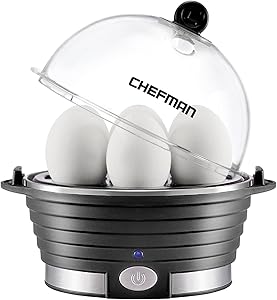How to Boil Eggs might seem like a simple task, but achieving the perfect level of doneness can be tricky. Whether you prefer soft, medium, or hard-boiled eggs, this guide will walk you through the different methods and tips to ensure you get it right every time.

Introduction on How To Boil Eggs
Eggs are a versatile and nutritious food, rich in protein and essential vitamins. Boiling eggs is one of the most common methods of preparing them, and it’s useful for a variety of dishes, from salads to sandwiches. Let’s dive into the basics of boiling eggs and why it’s a great cooking technique to master.
Different Methods on How To Boil Eggs
While the traditional stove method is the most popular, you can also boil eggs in the microwave. Here’s a breakdown of both methods:
Stove Method on How To Boil Eggs
- Place eggs in a single layer in a saucepan.
- Fill the saucepan with water, covering the eggs by about an inch.
- Add a pinch of salt to prevent cracking and a splash of vinegar to help with peeling.
- Bring the water to a rolling boil over medium-high heat.
- Once boiling, cover the pan with a lid and remove it from heat.
- Let the eggs sit in the hot water for the following times:
- Soft-boiled: 4-6 minutes
- Medium-boiled: 7-9 minutes
- Hard-boiled: 10-12 minutes
Microwave Method on How To Boil Eggs
- Fill a microwave-safe bowl with water and place the eggs in it.
- Add a pinch of salt to the water.
- Cover the bowl with a microwave-safe plate.
- Microwave on high for 5-7 minutes for soft-boiled, 8-10 minutes for medium, and 11-13 minutes for hard-boiled eggs.
- Be cautious when removing the bowl, as it will be hot.
Steps on How To Boil Eggs Perfectly
- Choose the right eggs: Fresh eggs are great, but slightly older eggs (about a week old) peel more easily.
- Prepare the water: Always start with cold water to ensure even cooking.
- Monitor the time: Use a timer to ensure you don’t overcook or undercook your eggs.
- Cool quickly: Once the eggs are done, place them in an ice bath to stop the cooking process and make peeling easier.
Tips for Easy Peeling
- Use older eggs: As mentioned, older eggs peel more easily than fresh ones.
- Shock in ice water: Immediately place boiled eggs in an ice bath for at least 5 minutes.
- Roll and peel: Gently roll the egg on a hard surface to crack the shell, then peel starting from the wider end.
How To Boil Eggs To Achieve Different Levels of Doneness
- Soft-boiled eggs: Cook for 4-6 minutes. The whites will set, and the yolk will be runny.
- Medium-boiled eggs: Cook for 7-9 minutes. The yolk will be slightly set but still creamy.
- Hard-boiled eggs: Cook for 10-12 minutes. Both the whites and yolks will be fully set.
Common Mistakes to Avoid on How To Boil Eggs
- Overcooking: Overcooking leads to a green ring around the yolk and a sulfuric smell.
- Starting with hot water: Starting with hot water can result in uneven cooking.
- Not cooling quickly: Skipping the ice bath can make peeling difficult and overcook the eggs.
Health Benefits of Boiled Eggs
Boiled eggs are an excellent source of high-quality protein, vitamins B6, B12, and D, as well as minerals like zinc, iron, and copper. They are also low in calories, making them a great addition to a balanced diet.
Uses of Boiled Eggs in Various Recipes
Boiled eggs are incredibly versatile. Here are a few ideas:
- Salads: Add sliced eggs to your favorite salads for extra protein.
- Sandwiches: Make a classic egg salad sandwich or add slices to your breakfast sandwich.
- Snacks: Simply season with salt and pepper for a quick and healthy snack.
- Deviled Eggs: Mix the yolks with mayonnaise and mustard for a delicious appetizer.
FAQ
1. How long can you keep boiled eggs in the fridge? You can keep boiled eggs in the refrigerator for up to one week.
2. Why do my boiled eggs have a green ring around the yolk? Overcooking causes the green ring. It results from a reaction between sulfur in the egg white and iron in the yolk. Although it’s harmless, you can avoid it by not overcooking the eggs.
3. Can you boil eggs without a lid? Yes, you can. However, covering the pot helps the water come to a boil faster and more evenly.
4. How do you prevent eggs from cracking while boiling? Adding a pinch of salt and gently lowering the eggs into the water can help prevent cracking.
5. Is it safe to eat eggs with cracks after boiling? Yes, but they might not look as appealing, and the texture can be affected.
